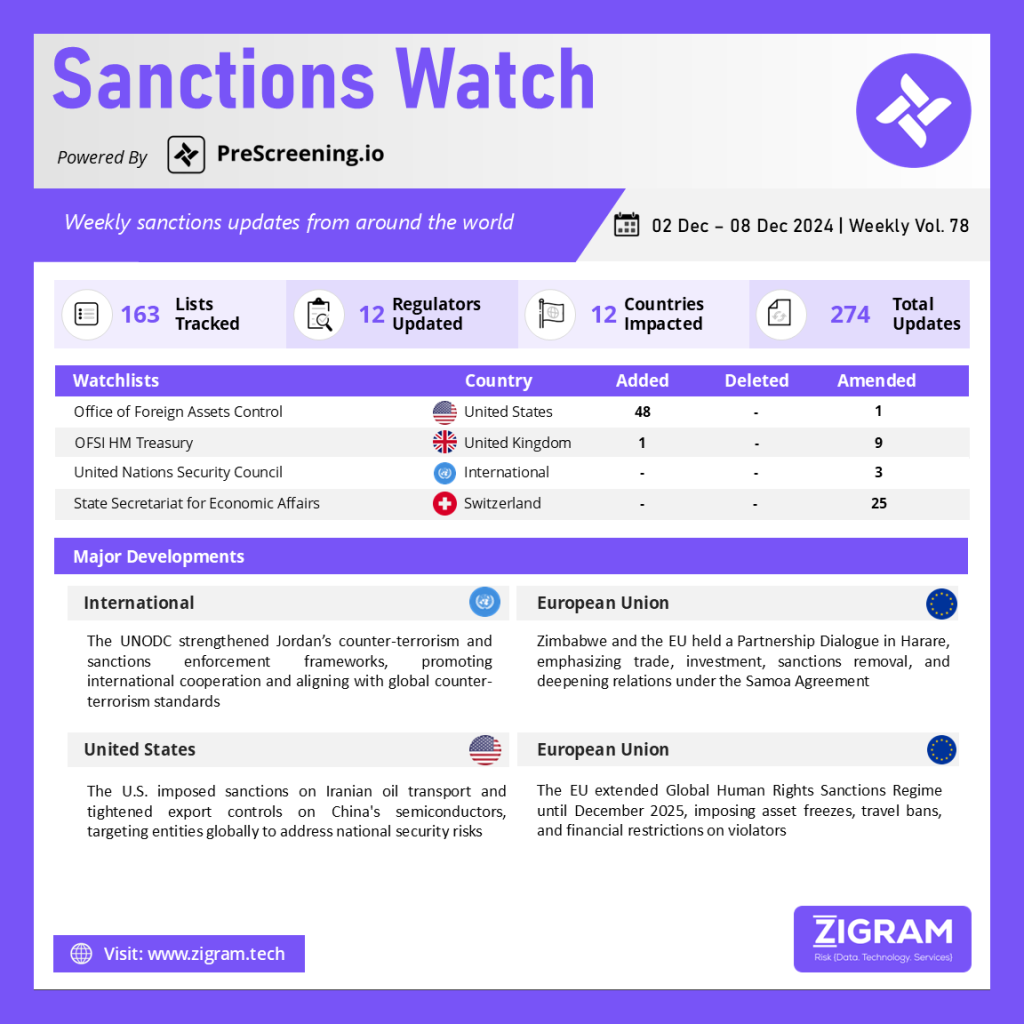Sanctions Watch Vol 78
In the latest edition of our Sanctions Watch weekly digest, we present significant updates on sanction watchlists and regulatory developments.
1. UNODC Supports Jordan to Implement UN Security Council Sanctions
The United Nations Office on Drugs and Crime (UNODC) organized a workshop in Amman from 1–3 December 2024 to support Jordan in enhancing its implementation of United Nations Security Council (UNSC) sanctions and countering terrorism financing. This initiative aimed to bolster Jordan’s legal and institutional frameworks, aligning with global counter-terrorism standards.
The workshop brought together representatives from Jordan’s Ministry of Foreign Affairs, law enforcement, criminal justice agencies, the Central Bank, and the Financial Intelligence Unit, among others. Expert contributions were provided by the UNSC’s Analytical Support and Sanctions Monitoring Team, Italy’s Guardia di Finanza, and Egypt’s Ministry of Justice, ensuring a robust exchange of international and regional practices.
Discussions covered enforcing asset-freezing mechanisms, prosecuting terrorism financing, and fostering international cooperation. Specific attention was given to UNSC resolutions 1267 (1999) and 1373 (2001), exploring designation criteria, appeal mechanisms, and sanctions processes. Jordanian officials shared their national experiences, highlighting opportunities for procedural optimization.
This workshop, funded by the UN Peace and Development Trust Fund, marked a significant step in strengthening Jordan’s counter-terrorism efforts. It reflects UNODC’s ongoing commitment to enhancing Jordan’s capacity to uphold international security standards and effectively combat terrorism financing through robust sanctions enforcement.
2. Zimbabwe and EU Engage in Partnership Dialogue, Call for Full Sanctions Removal
Harare, Zimbabwe – The Government of Zimbabwe and the European Union held a Partnership Dialogue in Harare, emphasizing their shared commitment to strengthening political and economic relations under the Samoa Agreement.
Key discussions centered on trade, investment, and the Structured Dialogue on arrears clearance and debt resolution, alongside good governance and land reform. The EU’s removal of most sanctions on Zimbabwe was highlighted, with Zimbabwe urging the lifting of the remaining restrictions on the Zimbabwe Defence Industries. The EU reaffirmed its openness to continued dialogue on this issue.
Trade and investment opportunities were explored, with both parties committed to deepening the Economic Partnership Agreement (EPA). The EU announced plans to mobilize European businesses and host an investment-focused event in early 2024.
The meeting concluded with commitments to strengthen collaboration and continue dialogue on sanctions, economic recovery, and other mutual priorities, with a follow-up dialogue scheduled within six months.
3. U.S. Expands Sanctions: New Restrictions Target Iranian Oil and Chinese Semiconductor Advancements
The U.S. has introduced new sanctions and export control measures targeting illicit Iranian petroleum transport and China’s semiconductor advancements to address national security concerns.
The U.S. Department of Treasury has sanctioned 35 entities and vessels, including two India-based companies, Vision Ship Management LLP and Tightship Shipping Management (OPC) Private Limited, for facilitating the transportation of Iranian crude oil. These entities are now listed under the Specially Designated Nationals (SDN) list, leading to the freezing of their U.S.-based assets and restricting their operations. Non-compliance with these measures by U.S. and non-U.S. persons may result in sanctions violations.
Simultaneously, the U.S. Bureau of Industry and Security (BIS) has strengthened export controls targeting China’s semiconductor production. New rules restrict access to U.S.-origin and foreign-produced high-bandwidth memory and semiconductor manufacturing equipment (SME). BIS has expanded the Entity List, adding 140 entities and updating others associated with advancing China’s military technologies.
These measures, which extend U.S. jurisdiction over foreign-produced items using U.S.-origin technology, underscore the need for global compliance. Entities involved in semiconductor supply chains or dealing with Chinese or Iranian counterparts should reassess their exposure and align with the updated regulatory framework to avoid significant penalties.
4. EU Global Human Rights Sanctions Regime: Renewed Until December 2025
The Council of the European Union has extended its list of individuals, entities, and bodies subject to restrictive measures under the EU Global Human Rights Sanctions Regime until 8 December 2025. These measures are part of the EU’s commitment to addressing serious human rights violations globally.
As of the latest update, 116 individuals and 33 entities are subject to asset freezes, and EU persons and entities are prohibited from providing funds or resources to them. Natural persons on the list are also banned from traveling to the EU.
This decision reflects the EU’s commitment to the universality and indivisibility of human rights. The sanctions regime, established on 7 December 2020, targets state and non-state actors responsible for severe human rights abuses. Listings are reviewed annually for accuracy. On 4 December 2023, the Council also extended the framework for three years, ensuring its validity until 8 December 2026. The EU continues to monitor developments and regularly reviews the listings.
Know more about the product: PreScreening.io
Click here to book a free demo.
Sanctions Watch is a weekly recap of events and news related to sanctions around the world.
- #Sanctions
- #RegulatoryCompliance
- #FinancialSanctions
- #UNSanctions
- #ComplianceMatters
- #JordanSecurity
- #GlobalGovernance
- #AML
- #KYC
- #RestrictiveMeasures
- #EconomicSanctions
- #SanctionsWatch
- #InternationalSanctions
- #EconomicSanctions
- #RegulatoryCompliance
- #TradeCompliance
- #SanctionsEnforcement
- #SanctionsViolations
- #WaterTreatment
- #SanctionsLaw
- #RegulatoryUpdate
- #GlobalCompliance
- #PeaceProcess
- #EconomicSanctions
- #SanctionsRegimes
- #SustainableGovernance
- #InternationalLaw
- #ConflictResolution
- #UKTreasury
- #GeneralLicense
- #OFAC
- #DueDiligence
